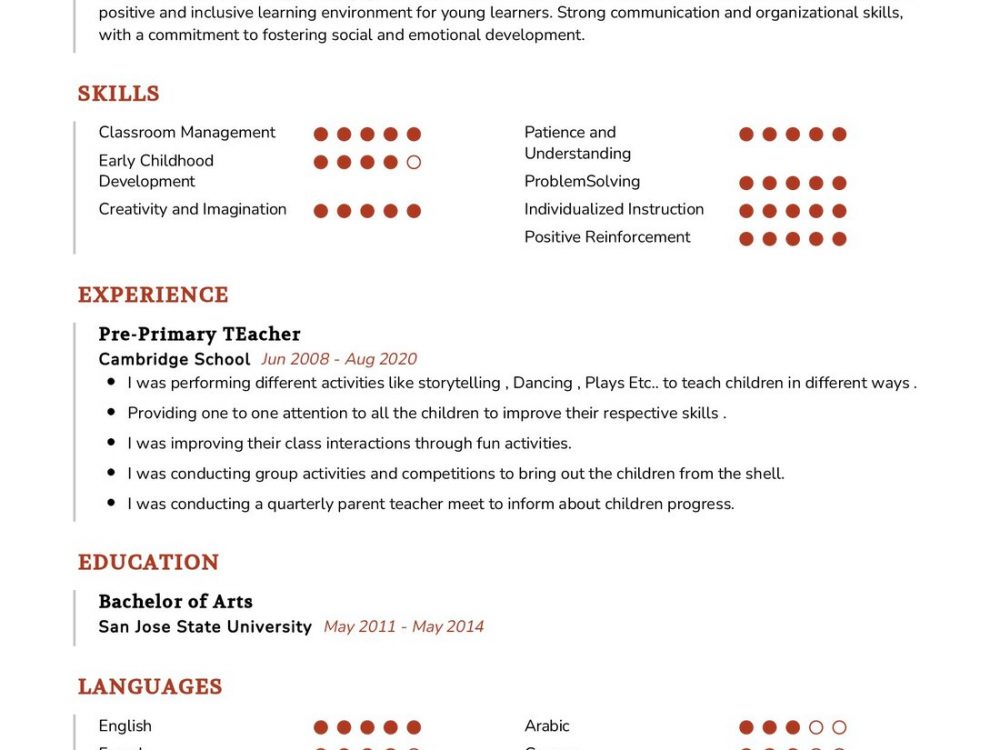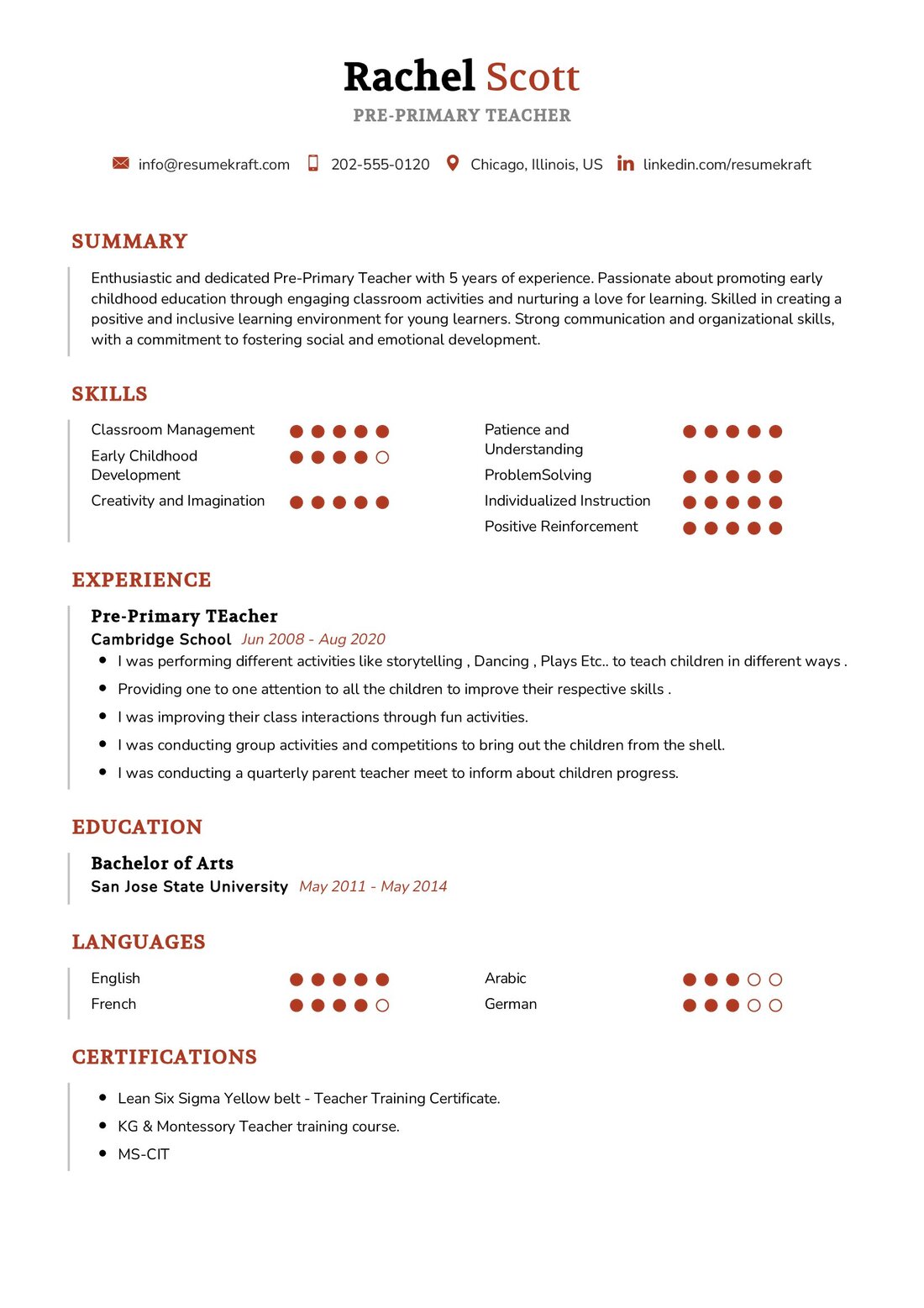The Essential Role of a Pre-Primary Teacher
As the world of education continues to evolve, the role of a Pre-Primary Teacher has emerged as a foundational pillar in shaping the futures of young learners. This role is a delicate balance of nurturing care, creative instruction, and unwavering patience, all aimed at providing a strong foundation for a child’s lifelong journey of learning. Let’s embark on a comprehensive exploration of the multifaceted role of a Pre-Primary Teacher, a position that demands not only a deep understanding of child development but also a passion for fostering a love of learning.
The Heart of Education: Pre-Primary Teacher Responsibilities
The responsibilities of a Pre-Primary Teacher extend far beyond the confines of a classroom. They play a pivotal role in a child’s early years, where every interaction and lesson lays the groundwork for future academic and personal success. Here are the core responsibilities that define this role:
- Creating a Nurturing Environment: A Pre-Primary Teacher is responsible for establishing a safe and welcoming classroom environment where young children feel secure and valued.
- Curriculum Development: Developing age-appropriate curricula that stimulate curiosity, creativity, and critical thinking skills in young minds.
- Lesson Planning: Designing engaging lessons that incorporate play-based learning, storytelling, and hands-on activities to make learning a joyful experience.
- Individualized Attention: Providing one-on-one support to children with diverse learning needs, ensuring that each child reaches their full potential.
- Parent-Teacher Collaboration: Maintaining open and regular communication with parents or guardians to discuss a child’s progress, challenges, and achievements.
- Social and Emotional Development: Fostering social skills, emotional intelligence, and conflict resolution abilities among young learners to prepare them for future interactions.
- Assessment and Progress Tracking: Conducting ongoing assessments to monitor a child’s development and adjusting teaching strategies accordingly.
- Safety and Well-being: Ensuring the physical and emotional safety of children within the classroom, including knowledge of first aid and emergency procedures.
Each responsibility is a building block, contributing to the holistic development of the children under a Pre-Primary Teacher’s care.
The Journey to Becoming a Pre-Primary Teacher
Becoming a Pre-Primary Teacher is a fulfilling journey that requires a unique blend of education, training, and a deep passion for working with young children. Let’s delve into the educational and personal prerequisites one needs to embark on this rewarding path:
- Education: A minimum of a Bachelor’s degree in Early Childhood Education or a related field is typically required. Some institutions may prefer a Master’s degree for advanced positions.
- Teacher Certification: Obtaining state or country-specific teaching certification is often mandatory to work as a Pre-Primary Teacher.
- Training in Child Development: Comprehensive training in child psychology, development milestones, and educational theories is crucial to understanding and meeting the needs of young learners.
- Patience and Empathy: Developing a deep well of patience and empathy is essential when working with children, as every child is unique and may require different approaches.
- Effective Communication Skills: Being able to convey ideas and instructions in a clear, age-appropriate manner is vital for successful classroom management.
- Creativity and Adaptability: The ability to think on one’s feet and adapt lessons to suit the changing needs and interests of children is a hallmark of a great Pre-Primary Teacher.
- Continual Learning: Staying updated with the latest research and educational trends in early childhood development is an ongoing commitment.
Securing additional certifications and attending professional development workshops can enhance a Pre-Primary Teacher’s profile in the competitive field of education.
Pre-Primary Teacher Resume Writing Tips
Your resume is your introduction to potential employers, a document that should effectively convey your qualifications, experience, and passion for educating young children. Here are some tips to create a compelling Pre-Primary Teacher resume:
- Highlight Your Experience: Emphasize your teaching experience, showcasing instances where you’ve made a positive impact on young learners.
- Showcase Innovative Teaching Methods: Detail creative teaching approaches, such as interactive activities, that have successfully engaged students.
- Include Quantifiable Achievements: Use metrics to demonstrate your effectiveness, such as improved student performance or successful classroom projects.
- Professional Development: List relevant certifications and workshops you’ve attended to stay current in the field of early childhood education.
- Customize for Each Application: Tailor your resume to match the specific requirements and values of the school or institution you’re applying to.
Remember, your resume is a reflection of your dedication to nurturing young minds and providing them with a strong foundation for future success.
Pre-Primary Teacher Resume Summary Examples
Your resume summary is your opportunity to make a strong first impression. Craft a concise yet impactful summary that highlights your unique strengths as a Pre-Primary Teacher:
- “Dedicated Pre-Primary Teacher with over a decade of experience in creating nurturing learning environments that inspire young minds. A passionate advocate for early childhood education and a track record of fostering a love for learning.”
- “Experienced Pre-Primary Teacher known for designing dynamic and interactive lessons that spark curiosity and creativity in young learners. Committed to individualized instruction and supporting each child’s unique development journey.”
- “Energetic and compassionate Pre-Primary Teacher with a talent for fostering social and emotional growth in children. A creative thinker who believes in the power of play-based learning to lay a strong educational foundation.”
Each summary should provide a glimpse into your teaching philosophy and your commitment to the growth and well-being of young students.
Crafting Your Pre-Primary Teacher Resume’s Experience Section
The experience section of your resume is where you can weave a narrative of your teaching journey, showcasing your milestones and contributions. Here are some examples to guide you:
- “Led a diverse classroom of young learners, implementing a play-based curriculum that resulted in a 15% increase in reading readiness scores.”
- “Initiated a school-wide literacy program, engaging students and parents in reading activities that led to a significant improvement in language development among Pre-Primary students.”
- “Collaborated with a multidisciplinary team to identify and support children with special learning needs, resulting in improved classroom inclusivity and student outcomes.”
Each experience is a chapter in your career story, demonstrating your dedication to the growth and development of young children.
Education and Training for a Pre-Primary Teacher
Your educational journey is the cornerstone of your career as a Pre-Primary Teacher. Here’s how you can showcase your educational qualifications:
- Bachelor of Science in Early Childhood Education, XYZ University, a foundational degree that provided in-depth knowledge of child development and educational principles, 2018.
- Master of Education in Curriculum and Instruction, ABC University, an advanced degree that enriched my teaching strategies and instructional design skills, 2020.
- State Teaching Certification, [Your State], a credential that certifies my qualifications as a Pre-Primary Teacher, 2019.
Each educational milestone is a testament to your commitment to becoming a highly qualified educator for young children.
Skills that Define a Pre-Primary Teacher
Your skill set is your toolkit, equipped with the essential abilities needed to excel as a Pre-Primary Teacher. Here are the key skills you should possess:
Soft Skills:
- Patience and empathy, vital for understanding and addressing the diverse needs of young learners.
- Effective communication and active listening, essential for connecting with children and their parents or guardians.
- Adaptability and creativity, allowing you to tailor lessons to suit individual learning styles and interests.
- Organizational skills, to manage classroom activities and maintain an efficient and structured learning environment.
- Empathy and compassion, enabling you to provide emotional support to children as they navigate the early stages of development.
Hard Skills:
- Curriculum development, the ability to design age-appropriate lesson plans and learning materials.
- Classroom management, skills to maintain order and create a positive learning atmosphere.
- Evaluation and assessment, the expertise to monitor student progress and adjust teaching strategies accordingly.
- Child psychology, knowledge of developmental stages and behaviors in young children.
- Technological proficiency, the ability to integrate educational technology effectively into the classroom.
Each skill is a tool in your educational arsenal, aiding you in providing young learners with a strong foundation for their future.
Common Pitfalls to Avoid in Your Pre-Primary Teacher Resume
When crafting your resume, it’s important to avoid common mistakes that can hinder your chances of securing your dream Pre-Primary Teacher position. Here are some pitfalls to steer clear of:
- Using a generic resume: Tailor your resume for each application to highlight your suitability for the specific school or institution.
- Focusing solely on job duties: Instead, emphasize your achievements, innovations, and positive impacts on students and their learning journeys.
- Neglecting the cover letter: A well-written cover letter allows you to connect with potential employers on a personal level and express your enthusiasm for the role.
- Overloading with educational jargon: Use simple and clear language to ensure your resume is accessible and easily understood.
- Failing to proofread: Typos and grammatical errors can detract from your professional image, so review your resume carefully before submitting it.
Avoiding these mistakes will help you craft a resume that effectively showcases your qualifications and dedication to educating young children.
Key Takeaways for Your Pre-Primary Teacher Resume
As we conclude this comprehensive guide, let’s recap the key points to keep in mind while crafting your Pre-Primary Teacher resume:
- Highlight your nurturing and educational experiences, showcasing your ability to create a supportive learning environment.
- Emphasize your creative and adaptable teaching methods, demonstrating your commitment to engaging young learners.
- Showcase your quantifiable achievements, using metrics to illustrate your impact on students and their educational journeys.
- Include relevant certifications and professional development to highlight your commitment to ongoing learning and growth as a Pre-Primary Teacher.
Finally, feel free to utilize resources like AI Resume Builder, Resume Design, Resume Samples, Resume Examples, Resume Skills, Resume Help, Resume Synonyms, and Job Responsibilities to create a standout application and prepare for the Pre-Primary Teacher job interview.
Your resume is not just a document; it is your canvas to paint the picture of your dedication, creativity, and passion for nurturing young minds. Best of luck in your pursuit of a fulfilling career as a Pre-Primary Teacher!


